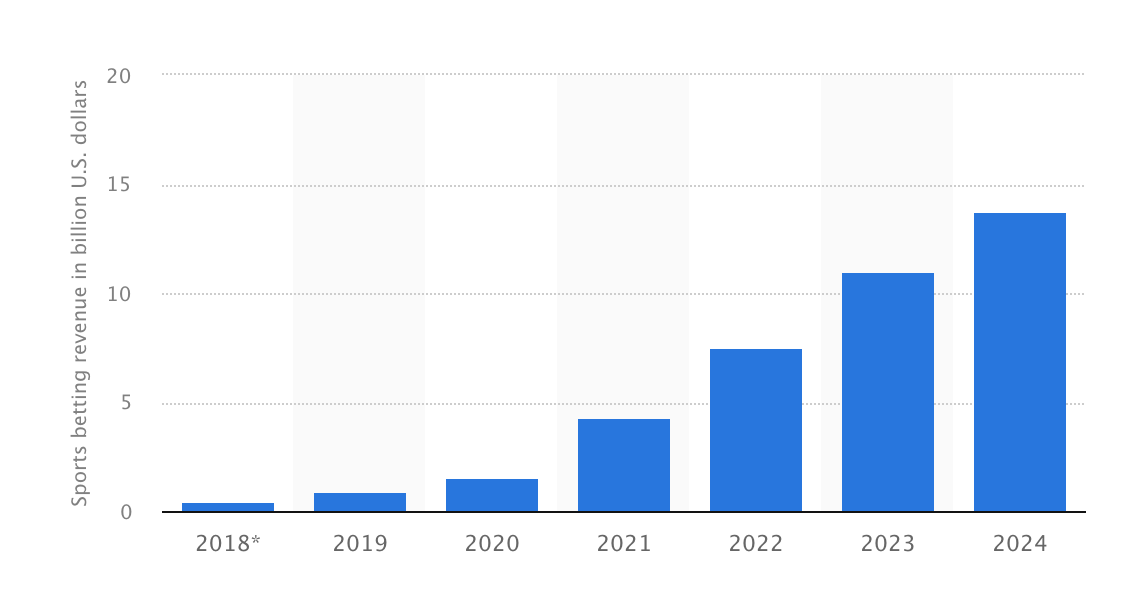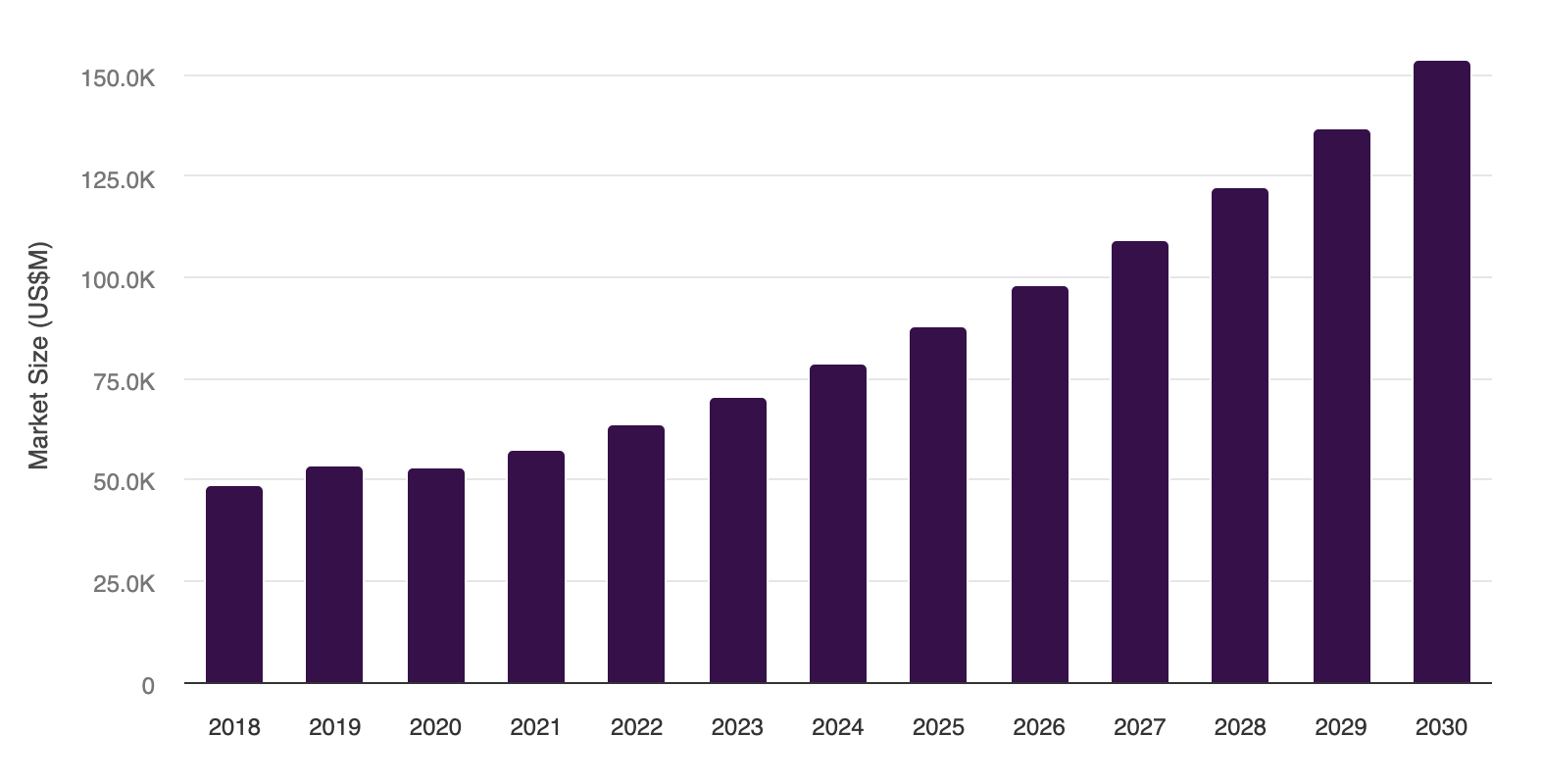What Are iGaming and iGaming Platforms? Industry Overview, Trends, and Technology
The iGaming industry is a large part of online entertainment, bringing the latest technology to one of mankind’s oldest activities — games of chance and skill.
Due to skillful gambling developers, casino lovers can spin a mobile slot game, bet on a live football match, or play an online poker room with players from all corners of the globe — all at home.
Statista indicates that the revenue in the gambling market will reach $449.67 billion by 2025, so just imagine the scale and potential of the segment within it, especially as more players move online.

Total sports betting revenue in the United States from 2018 to 2024, Statista
iGaming Industry: Meaning and Market Snapshot
iGaming is any type of online gambling or gaming that people can do using the internet. It includes:
- Playing online casino games, such as slots, roulette, and blackjack
- Placing bets on sports
- Playing poker and other card games on the web
- Fantasy sports betting and eSports betting
- Gaming and online betting with live dealer games
Technically speaking, if you’re betting on games or playing online for money, that’s iGaming.
iGaming vs. Gambling vs. Online Casinos
While often used interchangeably, these terms have subtle distinctions:
- Gambling: A broad category including both online and offline betting.
- iGaming: Digital gambling — the “i” stands for “internet”.
- Online casinos: A subset of mobile gaming focused on virtual versions of traditional casino games.
Market Size and Forecast
The size of the casino and online gambling market has remained steady over the past several years, with most of the revenue generated from the United States ($121.29 billion).
The largest reduction in market size was observed during the coronavirus pandemic, which caused global disruption in the whole sector and brick-and-mortar casinos in particular.
While casinos struggled, the online gambling subsection appeared to be much more resilient during the pandemic. Valued at an estimated $78 billion in 2024, the sector is projected to grow to $153 billion by 2030.

Why the iGaming Market Is Booming — Main Drivers in 2025
The iGaming vertical is growing fast in 2025, thanks to a few meaningful reasons. First of all, there are more people able to access iGaming through their mobile phones.
Mobile-enabled websites and apps allow players to gamble on sporting matches, spin slots, or play poker anywhere at any time, and it is now more convenient to play than ever.
On the other hand, the majority of countries are amending their laws to legalize and regulate online gambling. In Europe, the legislation is becoming clearer and safer for the players.
Latin American countries like Brazil and Argentina are opening up their markets, and in the United States, more states are legalizing online sports betting. These changes aim to allow businesses to operate legally and give assurance to gamblers to play.
Payment options are also improving. From popular digital wallets to cryptocurrencies (Bitcoin, Ethereum) and NFTs, new ways to deposit and withdraw money make the whole process faster and more convenient.
Crypto, especially, is becoming popular where banking options are limited or where users want more privacy.
Finally, the entire field wins more trust. iGaming operators assure the security of players’ funds and data through safe means.
Being licensed by trusted institutions such as the Malta Gaming Authority or the UK Gambling Commission also reassures players. And in addition, responsible gaming features guarantee players stay in charge.
Main Types of iGaming Solutions
iGaming involves various types of online casinos and betting, each offering something different for clients.

The most common are casino games played online. These include computerized slots, roulette, blackjack, and other related games. They are easy to play, graphically tempting, and often have bonuses and jackpots to reward players.
Sportsbook websites (the runner-up on the list) allow customers to wager on actual sports events, such as football, basketball, tennis, and others. Players may wager before the match takes place or during the match, with in-play betting options and continuously updated odds.
Third are live dealer games that bring the actual casino experience to the internet. Participants sit down in a live video stream with an actual human dealer and put in bets in real time. It’s a great combination of online ease and the ambience of an actual-life casino.
Poker and card game parlors are ideal for competition and strategy-loving players. Players can sit down at online tables, play games like Texas Hold’em, and join tournaments against other players worldwide.
An equally popular trend lately is eSports betting. Those sites allow users to bet on professional video games, such as League of Legends, Dota 2, or CS:GO. Since eSports involves massive audiences, betting is more in fashion than ever.
Fantasy sports websites enable users to create their own virtual teams using real players. The team’s performance is dependent on the performance of the players in actual games. Players compete against one another for points and prizes, either every day or season-long.
Overall, it’s important to note that the majority of iGaming websites currently offer a mix of these solutions to attract more users and interact with users of different game and bet types.
How iGaming Platforms Work: Tech and Architecture Basics
iGaming sites may appear simple on the surface, but underneath lies a lot of powerful technology. In order to deliver fast, fun, and safe experiences, sites need to be carefully built and well-connected from the inside out.

Core Backend Architecture
At the heart of an iGaming platform lies backend development needed to manage player data, transactions, game logic, odds calculations, session tracking, and other aspects.
Frontend: Mobile and Web UX
The frontend is what players see and use — the app or site. A good iGaming frontend should:
- Be clean and easy to use
- Work properly on desktops, tablets, and phones
- Respond fast and load quickly
The longer individuals linger and play, the better the user experience.
Payment Gateways and KYC Modules
To be able to play using real money, users need to deposit and withdraw money. That’s why websites have:
- Card payment gateways, e-wallets, and even cryptocurrency
- KYC (Know Your Customer) software to authenticate a player’s identity
- AML (Anti-Money Laundering) scans to identify suspicious activity
Altogether, these features allow platforms to comply with legal requirements and safeguard players.
Admin Panels & Player Dashboards
When running iGaming software, operators need full visibility and control — from user management and bonus systems to risk and fraud monitoring. The admin panel enables them to:
- Add or remove games
- Monitor player behavior
- Establish promotions and bonuses
- View performance reports
Meanwhile, players need to have their own dashboard as well, where they can view their balance, wagers, bonuses, and account details.
Real-Time Updates and Analytics
iGaming sites handle a lot of real-time data, especially for live betting and casino games. They also use analytics to:
- Understand player behavior
- Offer personalized promotions
- Detect cheating or fraud
Key Technologies Behind Modern iGaming Platforms
In addition to the inherent system and architecture, modern iGaming platforms are developed over a myriad of cutting-edge technologies to maximize fairness, customization, and overall player experience.

One of the largest creations is blockchain. It’s believed that with blockchain game development services, gambling platform owners can ensure transparency and trust by using smart contracts. These contracts can independently issue payouts, bonuses, and rewards, making sure game outcomes can’t be tampered with or changed.
Another important technology is artificial intelligence (AI) and machine learning (ML). These technologies allow platforms to gain more insight into the behavior of their players, detect suspicious activity, and give personalized game recommendations.
Moreover, AI powers chatbots that provide instant customer service, whereby users can get help at any time.
For the support of multiple players, platforms use scalable cloud infrastructure. It helps them scale very quickly as the users increase, reduce downtime, and make updates or introduce new features without compromising on gameplay.
Finally, live interaction and streaming are an integral part of live dealer gaming and real-time sports betting. These services depend on low-latency video streaming and instant data refreshes, so players can bet, communicate, and watch the action unfold — all in real time.
Regulation and Compliance in iGaming
Regulation has an important part in how iGaming platforms are created and managed. Different countries and regions have established their own regulations, which can encourage or hinder online gambling development.
In some areas, the online gambling industry is fully legalized and controlled, creating a noncontroversial environment for players.
However, in other countries, gambling may be limited or even prohibited, which forms more challenging conditions for online gambling operators, as they must navigate legal and regulatory aspects.
Importance of Licenses
Getting the right license is one of the first and most important steps for any iGaming business. A valid license:

- Indicates that the site is legal
- Assists in building player trust
- Usually required by app stores and payment processors
Among the most esteemed licensing jurisdictions are:
- MGA (Malta Gaming Authority)
- Curacao eGaming
- UK Gambling Commission (UKGC)
- Isle of Man, Gibraltar, and Kahnawake
Every licensing authority has its own application process, charges, and conditions, but all aim to achieve the same objective of protecting players and upholding fair play.
Data Protection and Anti-Fraud Compliance
In addition to licensing, iGaming software must also adhere to strict data security and anti-fraud protocols:
- GDPR: Protects personal data, especially of European players
- KYC (Know Your Customer) and AML (Anti-Money Laundering): Verifies player identity and prohibits illegal play
- PCI DSS: Securely stores payment details
These compliance standards are not optional; they are mandatory to operate legally and to maintain user trust.
How Regulation Impacts Development
Regulations touch on almost every part of online gambling platform creation. From data storage and processing to customer registration and authentication, compliance must be considered from the outset. Normally, it entails:
- Structuring the database to protect personal and financial data
- Developing user flows that are friendly to KYC checks
- Including geo-blocking and language settings to meet local regulations
Planning for compliance from day one prevents time-wasting delays, rebuilds, or legal problems in the future.
Custom iGaming Software vs. Ready-Made Platforms
When beginning an iGaming project, one of the initial decisions is whether to host your site on a pre-made (white-label) platform or develop your own customized solution.

Each has advantages — mainly, it comes down to what you’re trying to accomplish, your price tag, and how quickly you need to go to market.
Custom Development
Custom platforms give you total control. You can build the features, design, and user interface as you desire, without being limited by someone else’s software constraints.
By and large, the custom approach is perfect for companies that want to stand out from the crowd, add special features, or grow in the future without hitting roadblocks.
While it’s more costly in the short term and time-consuming to make, a custom platform will generally be worth the investment in the long run. You get better branding, more flexibility, and a product that makes your company an extension of itself.
White-Label Approach
White-label solutions allow you to launch promptly and inexpensively. They have all the essential functionality you need — like casino platforms, payment processing, and user accounts — and you can layer on your own brand. The catch is that you can’t customize it completely or include new tools at will.
In summary, use white-label when you require speed and convenience, but use custom development when you need something out of the ordinary and long-lasting.
| Aspect | Custom iGaming Software | White-Label Platforms |
| Time to Market | Longer | Very fast |
| Cost | Higher upfront | Lower upfront |
| Customization | Fully customizable | Limited |
| Scalability | Easy to scale | May hit limits |
| Branding | Unique, full control | Basic branding only |
| Maintenance | Handled by you or your dev team | Handled by provider |
| Best For | Long-term growth, differentiation | Quick launch, low-risk entry |
| Ownership | Full platform ownership | No ownership – you’re renting features |
| ROI | Higher in the long run | Faster revenue, lower long-term potential |
Custom iGaming Software and Ready-Made (White-Label) Platforms
Why Businesses Choose SCAND for iGaming Development
SCAND is a custom software development company with over 25 years of experience building complex, high-load systems — including fintech, eCommerce, and enterprise platforms.
In recent years, we’ve brought this expertise to iGaming, helping clients create secure, scalable, and fully compliant platforms:
- We know high-traffic gaming and payment systems
- Our quick-study team is familiar with the ins and outs of the iGaming sector
- We build from scratch, integrate your site with leading game providers, and guarantee legality
- After launch, we provide assistance, monitor performance, and help with long-term updates
Whether you’re launching a new platform or modernizing an existing one, we can help you get to market faster with a solution that performs.
Frequently Asked Questions (FAQs)
What do I need to launch an iGaming platform?
By and large, you need a licensed entity, payment and gaming provider integrations, a secure backend, KYC compliance tools, and a well-designed user interface.
Is it legal to operate an iGaming business in my country?
It depends on your jurisdiction. Some countries allow licensed operation, others ban it. Always consult a legal advisor.
How much does it cost to develop a custom iGaming solution?
Costs vary widely depending on features, licensing, integrations, and platform complexity. A basic MVP may start at $50,000+, while full-scale solutions can exceed $200,000.
How long does it take?
On average, 4–9 months — from idea to launch — depending on the level of customization and regulatory hurdles.












